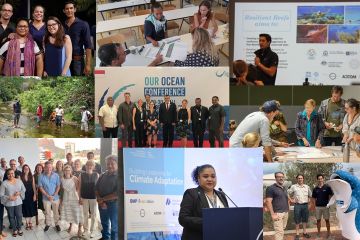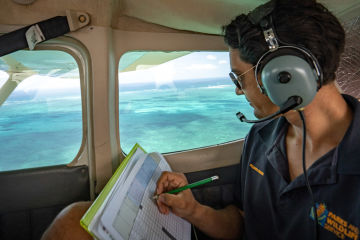Resilient Reefs
Partnering with Reef communities to respond to climate change and local threats.

"All World Heritage Marine sites urgently require a comprehensive and sustained program of action aimed at building resilience to give them their best chance to survive in the long-term."
The Future of the World Heritage Convention for Marine Conservation, UNESCO World Heritage Marine Centre, September 2016.

#Our Global Impact Program: Resilient Reefs Initiative
The Foundation has pioneered this global partnership to support World Heritage Reefs, and the communities that depend on them, to adapt to climate change and a combination of local threats.
Coral Reefs are critically important to the survival of the planet.
Not only do they support 25% of all marine life, but nearly one billion people across the globe—in more than 100 countries—depend on Reefs for food, wellbeing, and livelihoods.
They protect vulnerable coastlines from erosion and storms, contributing an estimated $10 trillion in ecosystem services.
And thousands of First Nations groups hold deep cultural connections to Reefs – with traditions and knowledge spanning tens of thousands of years.
But right now, 75% of the planet’s Reefs are under threat.
This includes the 29 Reef sites on the UNESCO World Heritage List – identified as holding extraordinary importance and universal value due to their exceptional marine biodiversity, unique ecosystems, and incomparable natural beauty.
Despite the best efforts of Reef managers around the world, business-as-usual approaches to Reef management are no longer enough. The impacts of climate change mean that the scale and urgency of the challenges need new approaches, right now.
The Great Barrier Reef Foundation is leading the charge by establishing the Resilient Reefs Initiative, a bold new partnership with Reef managers and Reef communities to jointly adapt in the face of growing uncertainty.
The Resilient Reefs Initiative is just getting started. But with your help, this ground-breaking initiative could be the game changer our Reefs and their communities so desperately need.
“Resilient Reefs is a bold, pragmatic approach to managing humanity’s most important Reef ecosystems in the face of a global climate crisis. Importantly, it is also a hopeful lifeline that gives people agency over their future, and the ability to adapt to a changing climate.”
Dr Fanny Douvere, Coordinator of the UNESCO Work Heritage Marine Programme

#What is Reef resilience?
Reef resilience is the capacity of Reef ecosystems and the individuals, businesses and communities that depend upon them to survive, adapt and recover from the stresses and shocks that they experience. By building resilience, we are strengthening the ability of Reef communities to prepare for and recover from disturbances, adapt to changing circumstances and plan for an uncertain future.

#The project
Pioneered by the Great Barrier Reef Foundation, the Resilient Reefs Initiative is a global partnership bringing together local communities, Reef managers, and resilience experts to develop new solutions for adapting to the effects of climate change and local threats.
A world first, Resilient Reefs directly responds to the call to action from those charged with managing the world’s most treasured Reefs – recognising that communities that depend on these Reefs are also threatened, and need to be part of the solution. While the interdependency of Reefs and their communities has long been recognised, Resilient Reefs is the first global program to deliver integrated Reef and community resilience planning, at scale.
Resilient Reefs draws on the successful 100 Resilient Cities initiative (a US$163 million project of the Rockefeller Foundation), which created deep structural change to bolster communities and infrastructure against systemic shocks and stresses of climate change in the urban environment. The Resilient Reefs Initiative brings the lessons from that ground-breaking resilience-building program into the management agencies for Reefs and coastal communities.
"From the perspective of a science reporter, the most innovative and key element about this project is that it does not simply tinker with small changes at the edge of profound ecosystem change. Unlike other projects, this one can, I believe, truly make a difference to communities and their marine environment, and that is because it is about bravely facing up to the reality of the enormous changes to our Reefs over the coming decades. Scientists have described in detail what climate change means for Reefs, and while many projects continue their conservation practice as usual, this one is different. This one compels all parties to accept the reality of global warming, and plan the best future for all with this in mind. This honest strategy gives communities strength, enabling them to have agency over their situation and to prepare for their future."
Gaia Vince, award-winning science journalist, author, broadcaster and speaker

#Resilient Reefs has 4 key pathways to create deep, lasting change
Build capacity of Reef managers to be agents of change and institutionalise resilience planning
Empower and equip local communities to take action and create sustainable jobs and income
Implement solutions that have a significant impact on Reefs and Reef communities
Foster a global network of Reef resilience leaders and inspiring others to build Reef resilience
#Global Expertise: Local Support
Never before has a consortium of resilience, climate change, and Reef experts and organisations come together in such a way as the Resilient Reefs Initiative.
A core component of the Initiative is its Knowledge Network – a taskforce of experts formed to help unlock the capacity of the Initiative’s Site Partners, support the development of integrated solutions to each site’s challenges, and share, educate, and scale knowledge beyond the pilot sites to Reef managers globally.
UNESCO World Heritage Marine Programme
Includes 50 flagship marine protected areas of Outstanding Universal Value that act as beacons of hope in a changing ocean. The Programme connects Reef managers from the 50 marine protected areas to share conservation solutions and accelerate successful results. The Programme also monitors and prepares evaluations of how countries protect their sites, assesses climate change impacts and invests in building resilience at the site level, and explores how the 1972 World Heritage Convention could protect places of Outstanding Universal Value beyond national jurisdiction.
The Nature Conservancy’s Reef Resilience Network
For more than 15 years, the Reef Resilience Network has served as a global leader in building the capacity of marine managers to effectively manage, protect, and restore coral reefs and reef fisheries around the world. To achieve this, we connect reef managers and practitioners with peers, experts, and the latest science and strategies, and provide online and hands-on training and implementation support. The Network is a partnership led by The Nature Conservancy that is comprised of more than 2,000 members, and supported by dozens of partners and TNC staff, as well as 100s of global experts in coral reefs, fisheries, climate change, and communication who serve as trainers, advisors, and content reviewers.
Columbia University’s Center for Resilient Cities and Landscapes (CRCL)
CRCL uses planning and design to help communities and ecosystems adapt to the pressures of urbanization, inequality, and climate uncertainty. CRCL works with public, nonprofit, and academic partners to deliver practical and forward-thinking technical assistance that advances project implementation through interdisciplinary research, visualization of risk, project design scenarios, and facilitated convenings. CRCL integrates resilience thinking into design education and academic programming, bringing real-world challenges into the classroom to train future design leaders.
Resilient Cities Catalyst
RCC is a nonprofit whose work is anchored in knowledge gained in the development of the urban resilience movement, bringing together a diverse set of skills across government, civil society and the private sector. RCC believes that resilience thinking combined with courageous leadership and radical collaboration will make cities stronger, more equitable and ultimately more resilient for current and future generations.
AECOM
A global network of experts working with clients, communities and colleagues to develop and implement innovative solutions to the world’s most complex challenges. AECOM’s role as program delivery partner is being led out of the Australian sustainability and resilience practice, with support from their global team. The sustainability and resilience practice works to develop, implement and facilitate ideas and tools to build community and ecosystem resilience. AECOM aims to translate the best science, design and analysis into practically achievable strategies. AECOM is recognised for meeting communities and organisations where they are at, and working with them to co-create solutions, prioritise action and monitor progress through an extensive understanding of assets, risks and vulnerabilities. AECOM worked closely with 100 Resilient Cities, working with over 35 cities globally. AECOM has completed hundreds of climate adaptation and resilience projects at local, regional, state, national and international scales, looking at climate hazards, risk, vulnerability and resilience. In addition to their partnership with 100RC, AECOM’s approach is informed by their work with major international programs such as the United Nations International Strategy for Disaster Reduction (UNISDR), and R!SE, founded by the UNISDR and PwC.
Reef Restoration and Adaptation Program
The Reef Restoration and Adaptation Program (RRAP) brings together Australia’s leading experts to create an innovative suite of safe, acceptable interventions to help the Great Barrier Reef resist, adapt to, and recover from the impacts of climate change.
Great Barrier Reef Foundation’s Traditional Owner Advisory Group
The purpose of the Traditional Owner Advisory Group is to offer strategic advice to guide the co-design and co-delivery of activities under the Reef Trust Partnership.
BHP Foundation
The BHP Foundation works to address some of the most critical global sustainable development challenges facing our generation. By working in partnership with others the BHP Foundation seeks to raise the bar, find new solutions and set new standards for the future. The BHP Foundation is a charitable foundation funded by BHP, a leading global resources company, and through the Foundation’s programs they address challenges that are directly relevant to the resources sector.
Great Barrier Reef Marine Park Authority
GBRMPA was established in 1975 to manage Australia’s – and the world’s – natural wonder, the Great Barrier Reef Marine Park.

#Resilient Reefs Board
The Resilient Reefs Project Board is an independent skills-based board, chaired by a Great Barrier Reef Foundation Board member.
The Board includes 8 world-leading experts across relevant fields such as resilience-based management, sustainable investment, conservation and more, all driven by finding solutions to the world's greatest challenges.

#Local impact: Global reach
Five World Heritage Reefs are involved in the Initiative
Each of these diverse and treasured natural wonders are under threat from a combination of both commonly-shared, and site-specific challenges.
Resilient Reefs partners with the Reef management organisations of these sites and provides a wide range of resources, connections, and technical expertise, all focused on building concrete solutions.
These solutions will look different site to site but may include, for example, efforts to:
· diversify local economies to improve community well-being and reduce pressure on the Reef
· create integrated disaster plans to help both the Reef and community endure climate events such as cyclones and coral bleaching
· develop blue carbon initiatives to protect natural ecosystems and generate new financial support for conservation
· improved land and wastewater management to limit pollution and reduce negative impacts on the reef and communities
The Resilient Reefs Initiative has set aside AUD$5 million in seed funding to support on ground implementation.
As pilot sites implement innovative solutions, Resilient Reefs helps share and scale these lessons to Reef communities around the world.
Through partnering with the Reef management organisations for each site, all five World Heritage listed sites are expected to benefit from the innovations, learnings, and outcomes of the Resilient Reefs program. The Initiative’s delivery model and partnership approach may differ across sites to best meet the unique needs and circumstances of each location.
#Resilient Reefs Sites
Select a Reef site to learn more.
#Site Partners
Resilient Reefs partners with the local Reef management organisations tasked with managing the Initiative’s pilot Reef sites.




#Project partners
#News

Project News ·
Solution Exchange 2020

Faces of the Reef ·
Joel Johnsson

Faces of the Reef ·
Pierre Bouvais
Initiated by the Great Barrier Reef Foundation, Resilient Reefs is a collaboration with UNESCO World Heritage Marine Programme, The Nature Conservancy’s Reef Resilience Network, Columbia University’s Center for Resilient Cities and Landscapes, Resilient Cities Catalyst and AECOM. The program is enabled by the BHP Foundation. These global partners each bring unique expertise and support to the pilot sites, as well as help to share the lessons and learnings from the Initiative with Reef communities around the world.












